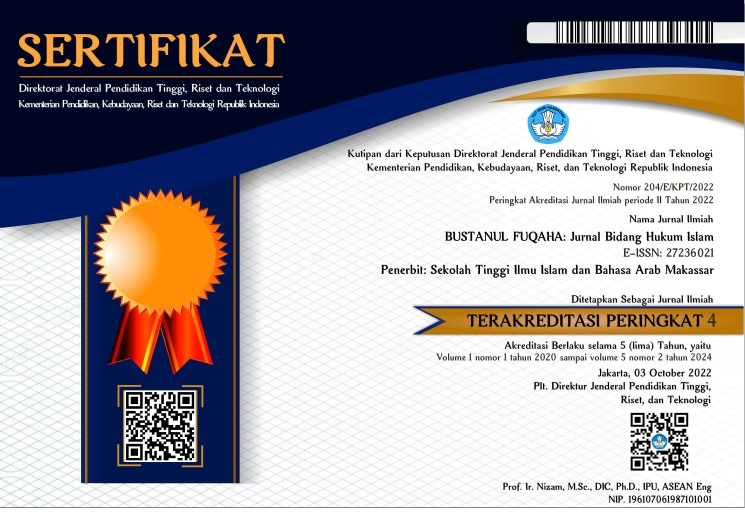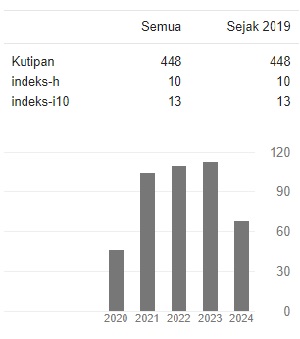Hukum Safar bagi Wanita Tanpa Mahram Menurut Mazhab Syāfi’ī dan Hambalī
Safar Law for Women Without Mahram According to the Shafi'ī and Hanbalī School
DOI:
https://doi.org/10.36701/bustanul.v2i3.412Keywords:
Hanbali School, Shafi'i School, Women's SafarAbstract
This study aims to find out the views of the Syāfi'ī and Hanbalī schools in the issue of safar for women without the company of mahrams. The research methods used are qualitative research through juridical-normative and comparative-analysis approaches. Where the research data focuses on the study of manuscripts and texts obtained through the classical jurisprudies of the two mażhabs, such as kitab al-um, Majmῡ', al-Mugnī, and other books related to safar for women without the company of mahram. The results of this study show that the Syāfi'ī school is of the view that in safar it is mandatory to do so with the position of the mahram that can be replaced by a trusted Muslim woman, or with a muslim girl group if the journey is safe from evil for herself and her religion. As for the view of the Hanbalī school, the existence of mahram is mandatory in women's safar, where this mandatory requirement applies in every obligatory journey or purpose of obligatory worship, even more so in the worship of sunah or safar mubah, and the tendency of this opinion refers to the specificity of the propositions about safar. An opinion that is more relevant to the current conditions in safar law for women without mahrams is the Syāfi'ī school, because it sees the changes and circumstances of the present times and also has the propositions naqlī and 'aqlī as supporters of this opinion, but still prioritizes the existence of mahram when it wants to bersafar.
Downloads
References
RI, Kementrian Agama. Al-Qur’an Dan Terjemahnya. Jakarta Timur: Ummul Qura, 2018.
Ah, Al-shari, Mohd Shauqi, Saiful Suhardi, Fakulti Undang-undang, and Hubungan Antarabangsa. “Analisis Isu Safar Wanita Tanpa Mahram Dari Perspektif Maqasid Al-Shari’ah” 3, no. 1 (2020): 74–83.
Al-‘Ainī, Badruddīn Abῡ Muḥammad Mahmuddīn Ahmad. “‘Umdatul Qāri Syarhu Al-Bukhari,.” Baeirūt: Dār al-Ihya at-Turas al-Arabī, n.d.
Al-Bukhārī, Muḥammad ibn Ismā’īl ibn Ibrāhīm. Ṣahīh Al-Bukhārī. Cet. I. al-Qāhirah: Dār ibn al-Jauzī, 2010.
Al-Hanbalī, Manshῡr bin Yῡnus. “Daqā’id Ulī an-Nuha.” Ālam al-Kutub, 1993.
Al-Naisābūri, Abū al-Ḥusain Muslim bin al-Ḥajjāj. Ṣaḥīḥ Muslim. Cet. VI. Beirūt: Dār al-Kutub al-‘Ilmīyyah, 2011.
Al-Nawawī, Abū Zakariyyā Yaḥyā bin Syaraf. “Al-Minhāj Syarḥ Ṣaḥīḥ Muslim,” Cet. II. Beirut: Dār Iḥyā al-Turāṡ al-‘Arabī, 2011.
Al-Nawawī, Yahyā ibn Syaraf. “Al-Majmū’ Syarh Al-Muhażżab.” Dār al-Fikr, n.d.
Al-Syafi’i, Abu Abdillah Muhammad Bin Idrīs. “Al-Umm.” Beirūt: Dār al-Ma’arifa, 1990.
Aziz, Abd, and Yuan Martina Dinata. “Pelacakan Hadis Bepergian Wanita Tanpa Mahram” 4, no. 01 (2021): 102–14.
Ibnu Qudāma, Abdullah bin Aḥmad. “Al-Mugnī.” al-Riyāḍ: Dār ‘Ālam al-Kutub, 2015.
Ibnu Qudāma, Abu Abdillāh bin Ahmād. “Al-Mugni Lī Ibnu Qudāma.” Maktabah al-qahār, 1968.
Miski. “Nalar Hermeneutis Ulama Hadis: Larangan Perempuan Bepergian Tanpa Mahram Dalam Ruang Sejarah Pemahaman.” Dinamika 5, no. 1 (2020): 71–95. doi:https://dx.doi.org/10.22515/dinika.v5i1.2464.
Qohtani, Sa’id bin Ali bin Wahfi Al. Al Safar Wa Ahkamuhu Fii Dhaui Al Kitab Wa Al Sunnah, 2000.
Ramli, Syamsuddin al. “Nihayatu Al Muhtaj Ila Syarhi Al Minhaj.” Beirūt: dar al fiker, 1984.
Sakr, Muhammad ’Iwad al, and Muhammad Amin al Munasiyah. “Safaru Al Mar’ah Bi Laa Mahram Baina Nash Al Fiqhi Wa Al Waqi’ Al Mu’ashir (Dirosah Fiqhiyah Maqoshidiyah).” Al Majallah Al Urduniyah Fii Dirosat Al Islamiyah 12, no. 1 (2016): 245–70. http://hdl.handle.net/123456789/1013.
Sālim, Kamāl ibn al-Sayyid. “Ṣaḥīḥ Fiqh Al-Sunnah Wa Adillatuh Wa Tauḍīḥ Mażāhib Al-Aimmah.” al-Qāhirah: al-Maktabah al-Tauqīfiyyah, 2003.
Soleh, Qamaruddin. Ayat-Ayat Perintah Dan Larangan. Bandung: CV. DIPONEGORO, 2002.














